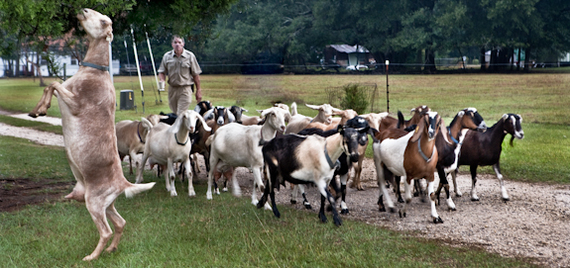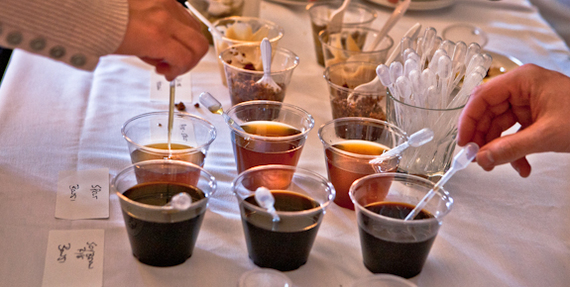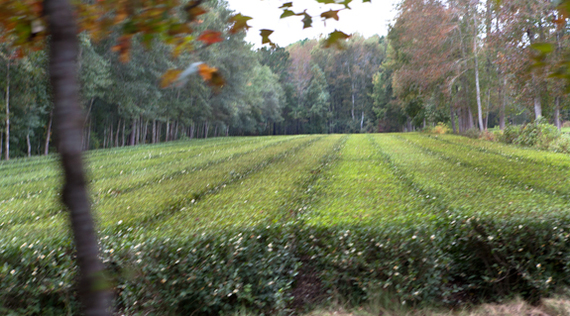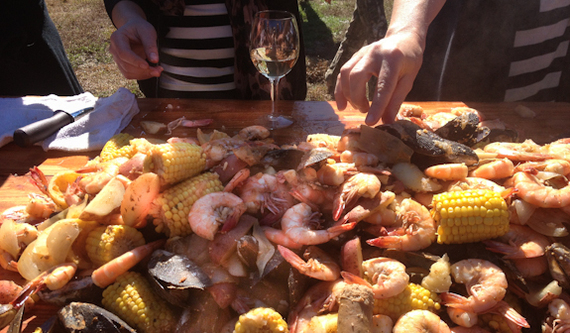Co-Author Lee Glenn
Photography © Julie Ann Fineman
With the rich agricultural heritage of the south as backdrop to historic Charleston, SC, I joined 300 of America's best chefs, food producers and food activists in early November, for the Chefs Collaborative National Sustainable Food Summit... a three day extravaganza of panel discussions and workshops covering taste testing microbes, hogonomics, the science of fermentation, lamb hamming, and influencing the health of our food system.
Two days before the summit, we went on field trips rich in southern food culture. We went oystering at Lady's Island Oyster Farm in the nation's largest undeveloped estuary. We toured expansive Chinese camellia plots in full blossom at America's only tea plantation.
We met farmers practicing humane hog raising. We learned about endangered local heritage grains revived by the Clemson Agriculture Research and Education Center. We walked Dirt Works Incubator Farms. We feasted on traditional low country fare culled from the local foodshed and waterways....but more on that later.
Kicked off with a whole hog and oyster roast, the sold-out, 20 year old celebration was rightly themed, "Looking Back, Cooking Forward."
In adherence to their original Charter & Statement of Principles, the first Board laid the foundation for this movement:
"We, the undersigned, acknowledging our leadership in the celebration of the pleasures of food, and recognizing the impact of food choices on our collective personal health, on the vitality of cultures and on the integrity of the global environment, affirm the following principles:
- Food is fundamental to life. It nourishes us in body and soul, and the sharing of food immeasurably enriches our sense of community
- Good, safe, wholesome food is a basic human right
- Society has the obligation to make good, pure food affordable and accessible to all
- Good food begins with unpolluted air, land and water, environmentally sustainable farming and fishing, and humane animal husbandry
- Sound food choices emphasis locally grown, seasonally fresh and whole or minimally processed ingredients
- The healthy, traditional diets of many cultures offer abundant evidence that fruits, vegetables, beans, breads and grains are the foundation of good diets
- As part of their education, our children deserve to be taught basic cooking skills and to learn the impact of their food choices on themselves, on their culture, and on their environment."
These original visionaries are today's who's who in the sustainable food movement. The authors include Jimmy Schmidt - Chairman, Larry Forgione -Co Chairman, John Ash, Rick Bayless, Mary Sue Miliken, Susan Feninger, Nobu Natsuhisa, Mark Miller, Wolfgang Puck, Allen Susser, Charlie Trotter, Alice Waters....and others.
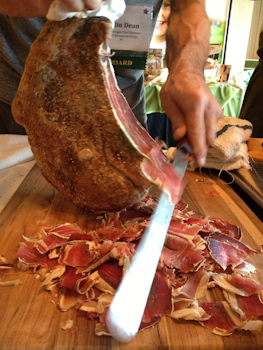 ...but back to this year's summit, where "hands-on skill-sharing, community-building, and of course - eating," rounds out the annual pilgrimage. Their ultimate goal is changing the quality of our food supply through the power of education, connectivity and responsible buying decisions. They are working to upgrade the quality of America's current food landscape.
...but back to this year's summit, where "hands-on skill-sharing, community-building, and of course - eating," rounds out the annual pilgrimage. Their ultimate goal is changing the quality of our food supply through the power of education, connectivity and responsible buying decisions. They are working to upgrade the quality of America's current food landscape.
I learned of the Chefs Collaborative from my interview with Chef Jimmy Schmidt last year in this series. We have an ongoing conversation on the antiquated communication system between farmer and chef, on the difficulty finding local sustainable sources, on clumsy invoice/payment systems and on expensive delivery logistics.
Nine months later, this gestation gave birth to the FoodShed Exchange, an online framework telling the story of farmers, ranchers, foragers, fishermen, specialty food purveyors, coupled with the chefs who source and use their products. These stories are the portal into a marketplace for chefs to efficiently purchase from great food producers. The system will ensure that favored sustainable food suppliers thrive for years to come...a mission aligned with the Chefs Collaborative.
"Change Menus. Change Minds," was the internal mantra of the Charleston conference, reinforcing the connection between chef and the sustainable food community. Consistent threads tuned in to seasonality, preserving diversity, supporting local economies and ultimately preparing healthier, better tasting foods, one plate at a time.
During session breaks, I conducted video interviews with chefs and food producers to discuss their interpretation of sustainability in practice. Every answer built upon the previous, revealing the many facets of this complex question.
From Chef Seth Caswell, Bon Appetit Management at Google: "Shortly after I started cooking I started to ask questions about where my food was coming from and how that what I'm feeding my customers is the best I can get for them."
From Paul Willis, Founder, Niman Ranch: "...it means the way we raise our animals, high animal welfare, something that's good for the animals, good for the land, good for customers, good for the farmer."
From Teresa Marquez, Advocate, Organic Valley: "We can't have sustainability unless we have a triangle...when we just think health, that's not sustainable. If we just think about the earth, that's not sustainable. If we just think about farming, that's not sustainable. We have to be working holistically."
The conference stressed the need for chefs to make purposeful buying choices and to educate on their reasons for serving sustainable food. At the closing luncheon at historic Lowndes Grove, New York Times Bureau Chief Kim Severson announced to the crowd: "Eaters have never been more primed to listen."
The Summits 'emcee, author Rowan Jacobsen, was equally provocative: "...cooking has surpassed both film and literature as a springboard for serious conversation. This is the healthiest art movement in America right now."
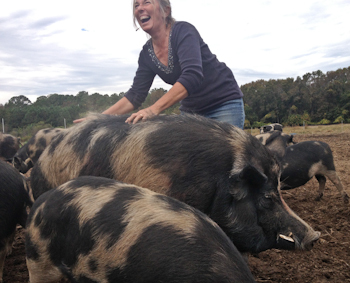 The Chefs Collaborative is growing exponentially and has our collective ear and firm commitment to their mission. Just as these ideals ring true for all members of major chef's organizations and the FoodShed Exchange, we will continue to share their voice and thank them for their drive to make the food world a better place.
The Chefs Collaborative is growing exponentially and has our collective ear and firm commitment to their mission. Just as these ideals ring true for all members of major chef's organizations and the FoodShed Exchange, we will continue to share their voice and thank them for their drive to make the food world a better place.

